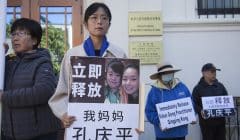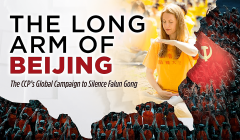Lana Han: Defending New York from Chinas Worst
Local Attorney Part of International Legal Effort

Books and notepads overflow off the desk to the chairs and floor in her small office in New York City –subtle deliberate organization evident among the mountains of files and notes.
She works in a small team, usually without funding or staff. Occasionally she wakes from a brief night’s sleep at her desk only to continue her labor anew. She is dedicated to a cause she knows to be profoundly worthy. Lana S. Han is an attorney volunteering to defend Falun Gong practitioners against the onslaughts of a totalitarian regime, both abroad and right here in her hometown of New York City.
As one of a growing group of attorneys taking an interest in the persecution of Falun Gong and bringing its perpetrators to justice, Han is providing legal support to the largest non-violent movement in China’s history.
Han left her position in a prominent New York law firm a year and a half ago to work full-time on behalf of people who practice Falun Gong. “I knew this effort would require my full attention, so my husband and I sat down to see if we could manage financially… we knew it wouldn’t be easy, but we saw we could get by and decided it was worth doing. If we don’t do it, who will?”
New Yorkers Suffer Blows From Abroad
In one case filed with the New York County Supreme Court, Han is representing Falun Gong practitioners who were assaulted on New York City streets by a group of men with known ties to the local Chinese Consulate. The men beat them outside of a Chinatown restaurant, shouting, “If you are Falun Gong, I’ll kill you!”
Han explains, “They think they can operate [in the US] like they do in China: beat people up, threaten them, and get away with it.
“We’re not going to stand by – no matter how much money they throw toward their defense, what they’re doing is wrong.”
In another case, Han recently filed a petition for writ of certiorari with the United States Supreme Court against two New York-based newspapers that serve as mouthpieces for the Chinese Communist Party.
The two newspapers have published a barrage of defamatory, intentionally falsified articles about the practice of Falun Gong and its local followers. The articles, interestingly, mirrored ones in Chinese government-run newspapers.
One of the papers being sued published over 300 anti-Falun Gong articles in three years’ time, claiming Falun Gong practitioners are “murderers,” “criminals,” and worse.
Since these articles are rarely translated into English, the false reporting has gone largely unnoticed by media watch-dogs in the U.S., even though these papers reach the majority of Chinese here.
The Growing Network
Han is part of a growing network of volunteers in the legal field. Earlier this year, she and others traveled to the Hague in the Netherlands to consult with the International Criminal Court and meet with other attorneys in Amsterdam and Paris.
All told, the volunteers’ efforts span 21 countries, and account for 26 lawsuits to date, from the United States to Spain, from South Africa to Taiwan.
Their cause has gone from obscure to front page in the last few years. Once a topic that Chinese leaders tried to sweep under the carpet, Falun Gong’s human rights lawsuits are now a key component in the world dialogue on China’s future.
The legal effort’s main focus is on former Chinese leader Jiang Zemin, but it also includes a host of Chinese officials who have participated in persecuting Falun Gong under Jiang’s direction. They are being sued for the illegal detention, torture, killing, rape, and disappearance of innocent civilians and other crimes against humanity. And, in some cases, genocide.
Lawsuits Around the World
The first Falun Gong case that gained international attention was filed in October 2002. Plaintiffs filed that month a class-action lawsuit in a U.S. District Court in Chicago against Jiang and the “Falun Gong Control Office” (a Gestapo against Falun Gong) for causes of action including “torture, genocide, and denial of the right to life.” Han has helped with the case.
Two days after the lawsuit was served in Chicago, China’s foreign ministry tried to deny that the lawsuit even existed, but was forced into a retreat when pressed by Associated Press reporters in Beijing.
In September 2003, the District Court judge claimed that Jiang enjoys immunity and dismissed the case. “The decision contradicts case law in the U.S.,” says attorney Dr. Terri Marsh, who represents Falun Gong in the case, “and ignores international treaty law and customary international law that stipulates heads-of- state and former heads-of-state may not enjoy immunity with respect to crimes against humanity.”
In the appeal to the Seventh Circuit Court of Appeals filed on January 20,
2004, 14 professors of international law filed an amicus brief, supporting the appeal, as did members of Congress.
Following the Chicago suit, in December 2002, attorneys William Bourdon and Georges-Henri Beauthier filed a suit in France for crimes of torture, against Li Lanqing. This is the first time in Europe that a Chinese leader has faced such charges.
Over the next two years, a total of 19 lawsuits were filed in Belgium, Iceland, Finland, Spain, Germany, South Korea, Taiwan, and other countries against Jiang and other senior Chinese officials for their roles suppressing Falun Gong.
Determined
Han and the attorneys working on Falun Gong-related lawsuits continue their efforts. They are determined to bring to justice who they call “one of the world’s most deadly but least-known dictators,” Jiang Zemin.
“We won’t ever give up,” concludes Han. “Even if Jiang and his cohorts shift the blame, even if the [Chinese Communist] Party finds a scapegoat, those responsible for these crimes against humanity will be found, exposed, and held responsible for the lives they destroyed.”






